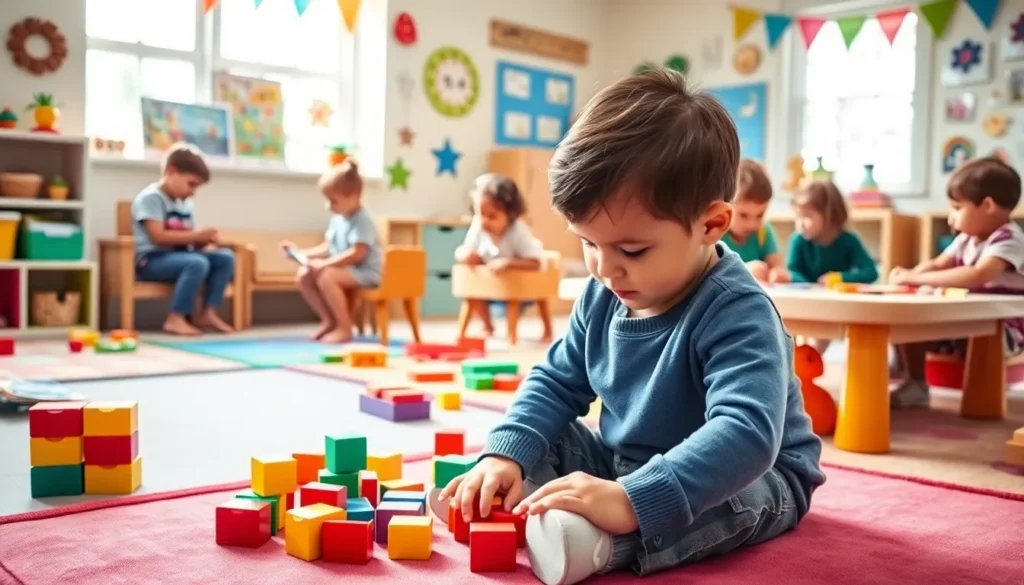In the colorful world of early childhood education, South Carolina’s Early Learning Standards are the secret sauce that helps little minds blossom. Think of these standards as the GPS guiding educators through the winding roads of child development, ensuring every child gets a head start on their educational journey. They’re not just a set of rules; they’re a promise to nurture creativity, curiosity, and a love for learning.
Table of Contents
ToggleOverview of SC Early Learning Standards
South Carolina’s Early Learning Standards set clear expectations for children’s development. These standards encompass essential domains including social-emotional, physical, cognitive, and language development. Educators utilize these guidelines to craft engaging and developmentally appropriate learning experiences.
The standards emphasize the importance of play in learning. Play serves as a key mechanism for children to explore, discover, and grow. Active engagement in hands-on activities supports children’s understanding of the world around them.
In addition, the standards advocate for inclusivity and diversity. They encourage educators to tailor learning experiences to meet the unique needs of each child. This approach fosters an environment where all children can thrive, irrespective of their backgrounds or abilities.
Assessments play a vital role in the implementation of these standards. Educators use various assessment tools to monitor child progress and inform instruction. Regular evaluations ensure that children are meeting developmental benchmarks outlined in the standards.
Collaboration among families, educators, and the community enhances the effectiveness of these standards. Partnerships strengthen the support network for children, allowing for a holistic approach to early learning. By working together, they can create a nurturing environment that promotes lifelong learning.
Overall, South Carolina’s Early Learning Standards provide a comprehensive framework that supports educators and children alike. These standards are essential for fostering creativity, curiosity, and a lifelong passion for learning.
Importance of Early Learning Standards

Early learning standards play a crucial role in shaping children’s educational experiences. These standards ensure that children develop critical skills throughout their formative years.
Impact on Child Development
Child development benefits significantly from implementing early learning standards. These guidelines support growth across essential domains, including social-emotional, cognitive, physical, and language development. When educators follow these standards, children engage in activities that enhance their curiosity and creativity. Social skills improve as children learn to collaborate and communicate effectively with peers. Cognitive abilities flourish through structured problem-solving opportunities. Consistent assessments help track progress, ensuring children meet developmental benchmarks, thus promoting well-rounded growth.
Benefits for Educators and Caregivers
Educators and caregivers also reap rewards from utilizing early learning standards. These frameworks provide clear expectations, guiding the planning of developmentally appropriate activities. With defined goals, educators can create engaging learning environments that foster exploration. Collaborating with families becomes easier, as the standards encourage communication about children’s development. Additionally, by embracing inclusivity, educators can tailor experiences to fit diverse needs. Professional development opportunities arise from understanding and implementing these standards, enhancing their skills and effectiveness in supporting children’s learning journey.
Key Components of SC Early Learning Standards
South Carolina’s Early Learning Standards encompass vital elements for child development. This framework supports educators in fostering growth and encourages creativity and curiosity in young learners.
Learning Domains
The standards outline critical learning domains, consisting of social-emotional, physical, cognitive, and language development. Social-emotional development emphasizes self-regulation and relationship-building skills. Physical development focuses on motor skills and overall health. Cognitive development targets problem-solving abilities and critical thinking, while language development enhances communication skills. Educators apply these domains to create engaging, developmentally appropriate learning activities that foster exploration.
Age-Specific Expectations
Age-specific expectations guide educators in setting developmental benchmarks for children from birth to age 5. These milestones establish clear goals that vary by age, ensuring they are appropriate for each child’s stage of growth. For example, infants focus on bonding and sensory experiences, while preschoolers engage in more complex play and social interactions. By tailoring expectations to specific ages, educators create personalized learning experiences that cater to individual needs, promoting optimal development.
Implementation Strategies
Effective implementation strategies ensure South Carolina’s Early Learning Standards achieve their intended impact. These methods emphasize continuous improvement and collaboration among all stakeholders.
Professional Development for Educators
Ongoing professional development plays a crucial role in equipping educators with essential skills. Workshops, training sessions, and peer collaboration help them understand and apply the standards effectively. The state sponsors programs that focus on best practices in early childhood education. Educators benefit from learning about diverse instructional strategies tailored for different age groups. Each professional development opportunity strengthens their ability to create engaging learning environments. Regular evaluations help ensure that training meets the evolving needs of students.
Engaging Parents and Communities
Involving parents and communities fosters a supportive learning environment essential for young children’s development. Educators can host informational sessions to explain the standards and their significance. Clear communication channels, such as newsletters or social media updates, keep families informed. Workshops designed for parents teach them how to reinforce learning at home. Community partnerships can provide additional resources and support, enhancing the educational experience. When families understand their role, they actively participate in their child’s learning journey, promoting a collaborative approach.
Challenges in Adopting SC Early Learning Standards
Adopting South Carolina’s Early Learning Standards presents challenges for educators and institutions, despite their importance in early childhood education.
Resource Limitations
Resource limitations significantly impact the effective implementation of the standards. Many early childhood education programs struggle with insufficient funding, affecting access to necessary materials and professional development opportunities. Educators often lack access to up-to-date training workshops, leading to difficulties in understanding and applying the standards. Additionally, limited staffing can hinder the ability to provide personalized attention to children, resulting in less effective learning experiences. Programs may also face challenges in obtaining age-appropriate learning resources, essential for fostering development across various domains. As a result, these limitations can restrict the overall quality of education offered to young learners in South Carolina.
Variability in Implementation
Variability in implementation can lead to inconsistent experiences for children across different educational settings. Each educator’s understanding and application of the standards may differ, creating disparities in learning environments. Some educators may prioritize certain developmental domains over others, impacting children’s comprehensive growth. The lack of standardized training programs further contributes to inconsistencies, as varying interpretations can arise among teachers. Furthermore, this variability can confuse parents and families, who may find it challenging to assess their child’s progress based on differing practices. Ensuring uniformity in the application of standards across institutions remains a crucial challenge in achieving equitable educational outcomes in South Carolina.
South Carolina’s Early Learning Standards play a crucial role in shaping the educational landscape for young children. By providing a structured framework that emphasizes creativity and curiosity, these standards guide educators in fostering essential skills across various developmental domains.
The commitment to inclusivity and collaboration ensures that every child’s unique needs are met, creating a supportive environment for growth. While challenges exist in implementation, the ongoing professional development and community involvement can significantly enhance the effectiveness of these standards.
Ultimately, embracing these guidelines not only enriches children’s learning experiences but also sets the foundation for lifelong learning and development.




